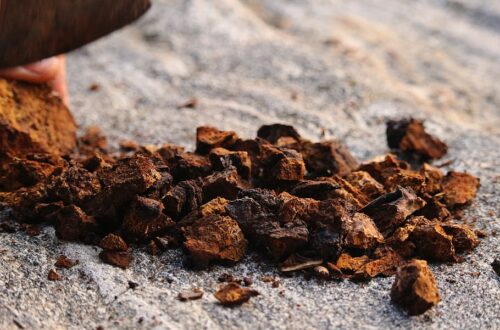
3 Ways to boost the immune system
How to boost the immune system during this pandemic
1. The Chaga Mushroom
If you haven’t yet heard of this potent medicinal mushroom, then you will do soon. It has been around for centuries, well documented in history and folklore. More recently it has caught the attention of the medical world and over 200 studies have been published supporting its healing properties.
It has so far shown promising evidence of antiviral abilities, specifically Hepatitis C and Herpes Simplex Viruses. No evidence has yet been collected on its effects for Coronavirus or specifically Covid-19 however this takes time, so watch this space for any new developments.
It also could have other amazing health benefits demonstrated by research including anti-cancer properties and anti-inflammatory effects, particularly in the bowel. It is thought to boost the metabolism and reduce high blood sugar, so could help to prevent diabetes and obesity.
The research is lacking in human studies and requires some human randomised controlled trials to really demonstrate its effectiveness and correct dosages. There are also some situations where it should not be taken. The Chaga mushroom can interfere with medicines that thin the blood such as warfarin as the mushroom also has anti-clotting properties. It lowers blood sugars so those on anti-diabetic medication (or any other medication) should avoid and/or consult their doctor before use.
How to take it? There are two main ways that Chaga can be ingested and that is either in powder (or supplement) form or as a tea. Personally I prefer a tea as the Chaga mushroom is high in oxalates which can cause kidney stones when taken in high amounts. Heating oxolates can reduce their potency so could reduce the effect of these when taken in hot water. It also has a really pleasant taste so personally I enjoy having it every evening as a caffeine free bedtime drink.
For more information check out my post on the evidence supporting the health benefits of the Chaga mushroom here.
2. The Sunshine Vitamin (Vitamin D)
In the past vitamin D has been associated with strong bones as it helped calcium absorption. More recently Vitamin D has been shown to boost the immune system and have anti-inflammatory properties. There has recently been some speculation around low levels of Vitamin D and worse outcomes in cases of Covid-19. There has not yet been time to create any trials to test this but studies looking at Europe suggest Vitamin D deficient countries appear to be worst affected. Additionally, black and minority ethnic people who are more likely to have vitamin D deficiency (because they have darker skin causing less absorption from the sun) seem to have worse outcomes in cases of Covid-19.
So given that vitamin D seems to have a range of benefits its a no brainer that we should try to stay topped up on this vitamin, but which way is best?
It is hard to find enough vitamin D from diet alone as only a few foods contain vitamin D such as eggs, salmon, tuna, cod liver oil and some mushrooms.
Sunshine or supplements?
The most natural way to stay topped up on vitamin D is sunlight however this may not be the most consistent especially if you live in the UK. The NHS suggest we should be supplementing during the winter months
Should I take vitamin D with a meal?
Yes evidence suggests taking vitamin D with a meal high fat can aid absorption.
What time of day?
The evidence suggests that Vitamin D taken late in the evening may affect sleep and can actually alter the genes that manage our body clock and directly affect our circadian rhythms (sleep cycles). So it may be best to take vitamin D in the morning to prevent it interfering with a good nights sleep.
Which supplement vitamin D 2 or 3?
Vitamin D exists in two forms D2 and D3. Research suggest that D3 is the most ‘natural’ from as it is what is made in humans when the sun hits our skin. Vitamin D2 is made from plant and yeast sources but isn’t as effective as being used by our body in this form.
Can I take too much?
You cannot overdose on vitamin D made from sunshine but too much sun can cause risks with over exposure especially if you have fair skin.
You can however overdose on Vitamin D supplements so do not take more than 1 microgram (1ug) which is equivalent to 40IU.
3. Eat the Rainbow
Red and yellow and orange plants such as carrot, butternut squash and pumpkin contain high levels of carotenoids which are converted by the body to vitamin A . This vitamin has been shown to improve the immune system as well as prevent heart disease, cancer and macular degeneration (improve eyesight… my mother wasn’t wrong when she told me to eat my carrots for better eyesight!).
Naturally green foods contain chlorophyll which is thought to have anti-oxidant properties. Chlorophyll supplements have recently become very popular but don’t actually contain chlorophyll they contain Cholrophylin which is similar except it contains copper instead of magnesium, but has still be shown to be effective in improving health, one study suggested it can prevent cancer in animals.
Blue and purple foods such as blueberries, red grapes, cabbage, aubergine, cherries or black rice contain high levels of pigments called anthocyanins that have bene proven to have a variety of benefits from anti-inflammatory to anti-microbial properties and protect against a number of diseases.
Beetroot is another purple vegetable but in this case its purple colour comes from Betalains, which are also very high in antioxidants. Beetroot is not a vegetable that many people associate with immunity however there is a wealth of evidence documenting beetroots beneficial properties. It is well associated with improving heart and blood vessel health as well as reducing blood pressure.
One of the proven benefits of beetroot is improving and protecting endothelial function. Endothelial cells line the inside of every blood vessel in the body providing a barrier between the blood and organs including the lungs, heart and kidneys. With recent data suggesting that Covid-19 affects the endothelial cells, could this humble root vegetable be a powerful tool in our immunity, improve our health and possibly even protect us from the serious complications of this coronavirus?
No studies have been carried out specifically linking beetroot and any coronaviruses but it would certainly warrant some further research in my opinion. As there is very little risk and a list of proven health benefits, I certainly don’t see any harm in introducing or increasing this root vegetable into our daily diets. For some inspiration on how to include beetroot in your diet check out my post on beetroot with two easy and delicious ways of enjoying this wonderful vegetable.


